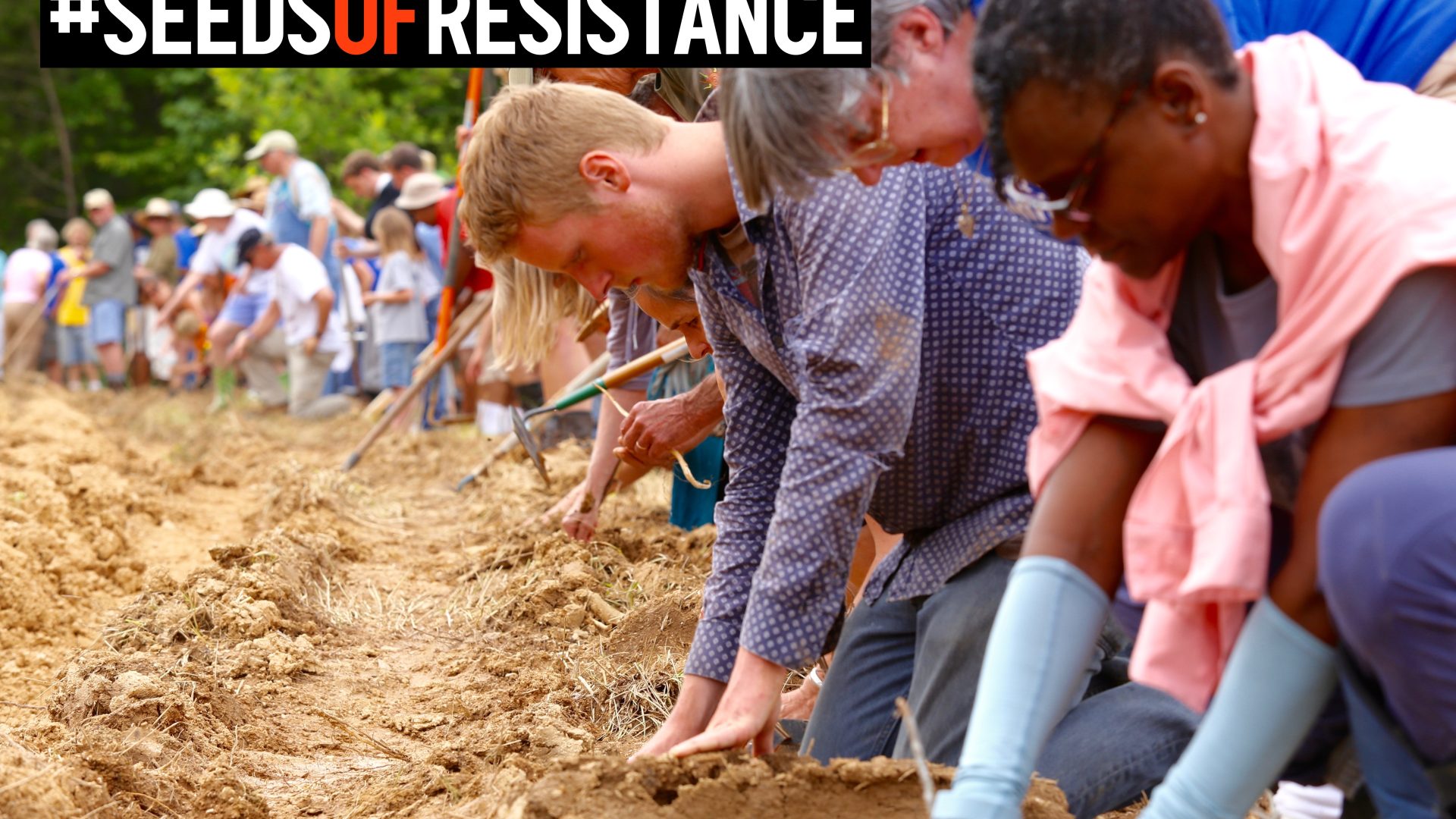
Spreading “Seeds of Resistance” against Pipelines
Seeds of resistance are spreading across the country, as landowners stand up for their land, their communities, and the climate.

Planting “seeds of resistance” along the proposed route of Dominion’s Atlantic Coast fracked gas pipeline.
The fossil fuel industry wants us to believe that natural gas is a “clean energy solution”, but we know we can’t use fossil fuels to fight climate change. The gas industry is embarking on one of the biggest pipeline buildouts in its history. Thankfully, seeds of resistance are spreading across the country, as landowners stand up for their land, their communities, and the climate.
Last week’s Seeds of Resistance Tour visited six pipeline-affected sites in Virginia and West Virginia along the routes of the proposed Mountain Valley and Atlantic Coast pipelines. The sites are all owned by people resisting the proposed pipelines coming through their land. Working with the Bold Alliance, Oil Change International traveled to these six sites with leading Keystone XL opponent and Bold Alliance President Jane Kleeb, Ponca Nation member and Bold Oklahoma Coordinator Mekasi Horinek Camp, and Nebraska farmer Art Tanderup.
Tom Berlin is a landowner in Weston, WV, whose land would be straddled by both the Mountain Valley and Atlantic Coast pipelines – one on either side of his property. He views planting Ponca corn as an act of solidarity, saying, “We’re supporting this planting project to stand in solidarity with our brothers and sisters throughout the world who are fighting a system based on continuous and accelerating extraction to the detriment of local individuals, communities, and ecosystems.”
Sacred corn was planted by the Ponca people for centuries, but when they were forcibly removed from their homeland in northern Nebraska in 1877, this tradition was lost. More than 135 years later, sacred Ponca corn was once again planted in the ancestral Ponca homeland in Nebraska, as part of the Cowboy and Indian Alliance’s opposition to the proposed Keystone XL pipeline.
At each stop, Jane Kleeb outlined the three-pronged approach used to block the Keystone XL tar sands pipeline, which she is now bringing to affected communities across the United States:
All of this must be supported by unlikely alliances. The fight against Keystone XL brought together farmers, ranchers, Native Americans, and people from all political backgrounds. Similar coalitions are forming across the country to fight proposed fossil fuel infrastructure, because we all need a stable climate and clean water and land for future generations.
Throughout the tour, landowners, local organizers and everyday people formed such unlikely alliances as farmers, artists, storeowners, pastors and folks from all walks of life came together to plant the sacred Ponca corn and listen to speeches. After the planting, there was time to talk, share stories and make connections with fellow pipeline fighters.
In Union, WV, landowner Patricia “Cookie” Cole described how for her the fight is not about just keeping the Mountain Valley pipeline off her land. Her family has farmed on the same Monroe County land for generations, and she initially opposed the pipeline because she didn’t want it to ruin her plot and the surrounding valley. But since getting involved, she’s realized it’s about much more than just one farm:
“This isn’t just about us – this is about stopping exploitation and injustice everywhere. We don’t just want them to move this [Mountain Valley] pipeline out of Monroe County. We want to stop them from building this pipeline anywhere, and from fracking anywhere. Because no one deserves to be stomped on and treated as a resource colony.”
The Seeds of Resistance Tour was a tremendous opportunity to show solidarity across pipeline fights and across states. Working together in the very soil we are trying to protect was an emotional and spiritual experience that gave communities a chance to come together and do something positive while building networks and knowledge. We’re going to need a lot more of this resistance to achieve a just transition to clean energy.
